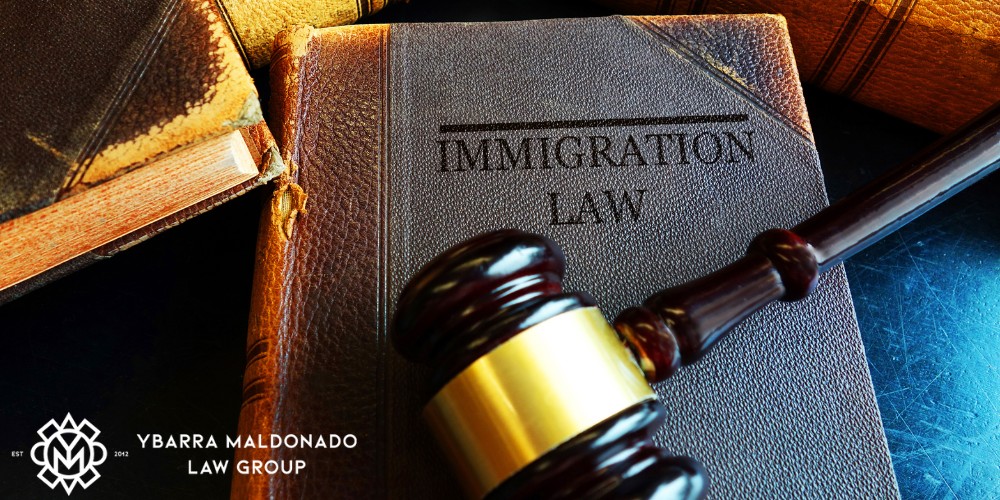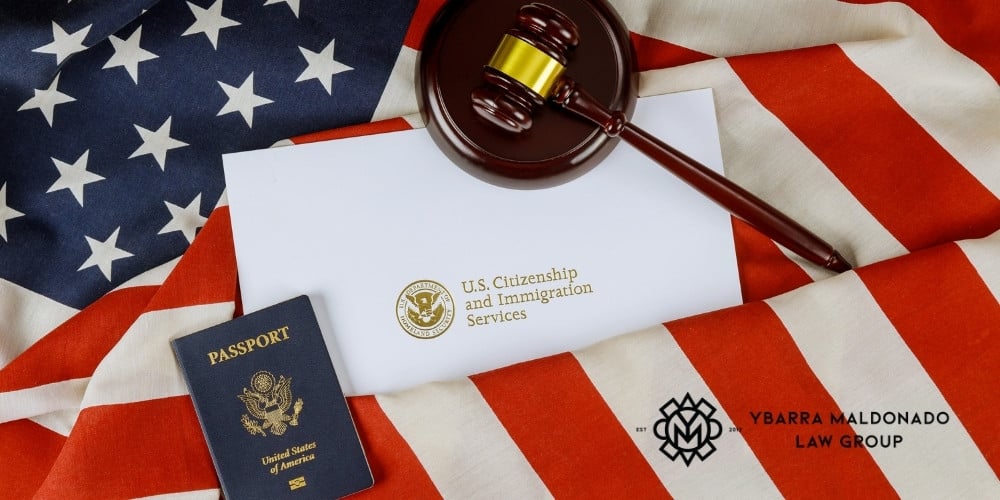PHOENIX IMMIGRATION LAWYER
Home » Practice Areas » Phoenix Immigration Lawyer
DON’T HESITATE TO REACH OUT TO US!
Our Law Firm is committed to becoming the best Law Firm for Latino, migrant, and Spanish speaking communities in Arizona.
Best Phoenix Immigration Attorneys
At Ybarra Maldonado Law Group, we take great pride in being the top immigration attorneys in not only Phoenix, Arizona, but across Maricopa County. Our team has years of experience helping immigrants secure a better life by helping them navigate the complex legal system.
Ray A. Ybarra Maldonado has been instrumental in many civil rights lawsuits and immigration cases over his career. He has dedicated his practice to helping immigrants and their families navigate the citizenship process, removal proceedings, and other immigration matters through legal services. Our Spanish-speaking team always strives to keep the families we serve informed throughout the entire process.
Our team acts in the best interests of our clients so they can rest easy knowing they’re in good hands during this difficult time. Our law firm offers honest advice and strategic plans to achieve favorable outcomes for our clients.
To schedule a free consultation for your immigration matter, please call our office at 602-910-4040 or complete our online intake form.
Immigration Attorney Help
- How Do I Choose the Best Immigration Lawyer in Phoenix?
- How Can a Maricopa County Immigration Attorney Help?
- How Can I Fix My Spouse’s Immigration Status?
- Can My Child Get My Immigration Papers When They Turn 21?
- If I Lose My Daca, What Are My Options to Stay in the Country Legally?
- My Loved One is Detained in an Immigration Detention Center, Can I Get Them Home?
- What Happens if a Dangerous Person is Eligible for a Bond Hearing?
- How Can I Stop My Deportation?
Immigration Services
Petitions Our Phoenix, Arizona Law Firm Handles
Immigration Help in Phoenix, Arizona
- Bond Hearings in Eloy and Florence
- Rodriguez Bond Hearings in Eloy and Florence
- Casas Bond Hearings in Eloy and Florence
- Request for Humanitarian Parole
- Stay of Deportations
- Stay of Deportations-9th Circuit
- Appeals to the Board of Immigration Appeals (BIA)
- Appeals to the 9th Circuit Court of Appeals
- Cancellation of Removal for Non-LPRs
- Cancellation of Removal for LPRs
- Motions to Suppress
- Challenging Allegations of Grounds of Deportation
Affordable Immigration Lawyers in Phoenix
We offer affordable payment plans for clients, ensuring access to top Phoenix immigration attorneys.
If you, a family member, or a loved one is in custody, we’ll assess bond eligibility for release, adjustment of status, or cancellation of removal options during the immigration process. Our experienced immigration attorneys fight passionately for clients, aiming to improve our community and Arizona as a whole.
Contact us at 602-910-4040 for an initial consultation with a Phoenix immigration lawyer today.

Phoenix Immigration Lawyer Open on Saturday
Several clients have asked our Phoenix immigration lawyers if we have Saturday appointments. Your family deserves to be heard by a trusted law firm.
Our Arizona law firm is open on Saturdays from 10 AM to 2 PM and Thursdays until 7 PM, offering later hours and payment plans if needed.
Criminal Defense and Immigration Law Firm in Phoenix, AZ
As experienced immigration lawyers, we know that immigration system work is rarely cut and dry. This is especially true when both immigration law and criminal defense intersect.
For this reason, our team has extensive knowledge of navigating both immigration and criminal defense law together.
This allows us to take the quick actions within the immigration system that are necessary to achieve the best possible outcome for immigrants seeking a better life during the criminal defense and immigration process.

FAQ for Immigration Matters
How Do I Choose The Best Immigration Lawyer in Phoenix?
If you need a good Phoenix immigration lawyer, you’ve come to the right place. Our team stays up-to-date with current immigration laws and has extensive experience with respect to handling in-custody and removal cases.
Our Phoenix immigration attorneys have years of experience in criminal defense and immigration law. Additionally, our team has some of the best track records for this complex immigration system. Our constant stream of positive reviews from happy clients speaks for itself.
How Can a Maricopa County Immigration Attorney Help?
An immigration attorney plays a crucial role in assisting individuals and families in navigating the complexities of immigration law and the citizenship process. They provide expert and honest guidance on matters such as visas, green card processing, naturalization and citizenship, defense for deported immigrants, and employment for non-citizens.
Beyond the bureaucratic paperwork and civil litigation, an immigration attorney can offer honest and strategic advice tailored to the unique circumstances of their clients, ensuring that each client maximizes their chances of a favorable outcome for their respective immigration cases.
Our immigration attorneys stay updated on the ever-evolving immigration laws and can represent clients in court. Our immigration practice advocates on behalf of each client individually and will assist in protecting their rights.
How Can I Help My Husband or Wife’s Immigration Case?
Being a United States citizen doesn’t provide an automatic right for your spouse’s legal status for various reasons. However, if you want to help your husband or wife’s immigration case, you can petition for your spouse’s citizenship status through the immigration process instead.
This can occur through marriage-based green card applications or fiance visas in most cases.
Speak with our team about marriage immigration assistance for more information.
Can My Child Get My Green Card When They Turn 21?
Many families will attempt this route if all other attempts within the immigration system have failed. A United States citizen can begin applying for their parents once they reach the age of 21 by applying for an I-130.
If I Lose My DACA, How Can I Stay in the Country Legally?
One of the most common paths to residency that our law firm has seen is through marriage to a United States citizen. If you enter the United States legally, the immigration process occurs entirely in the United States. Generally, the government grants clients permanent residency in less than a year.
Alternatively, our team can file an I-601 Waiver application, a VAWA application with USCIS (for domestic violence victims), or a U-Visa application.
If you have lost your DACA status for various reasons or think you might be eligible for one of the forms of relief for your specific immigration matter, please call our family-based Phoenix immigration attorneys at 602-910-4040 for a free consultation.
What Can I Do If a Family Member is Detained at an Immigration Center?
Detainees can receive a bond or parole from their ICE Officer under immigration law. Immigrants who don’t receive a bond from the ICE Officer can ask the judge for a Custody Re-Determination Hearing or bond hearing.
Our law firm has significant experience in these cases. Our experienced immigration lawyers have even argued and won a case in front of the Arizona Supreme Court on this issue. The State of Arizona appealed the decision, but the Supreme Court ruled in favor of our client and denied the request for a cert from Arizona.
What Happens If a Dangerous Person Is Eligible for a Bond Hearing?
If someone is eligible for a bond hearing, any arrest or criminal conviction must be directly addressed in front of the judge. This will show that the detained person is not dangerous.
A few key assets that can sway a judge’s decision include, but are not limited to, the following under the immigration law process:
Letters of support
Classes
A letter from the detainee
The brief and oral argument from the immigration attorney
After the non-dangerous verdict comes the “flight risk” assessment. For flight risk concerns, the judge will issue a bond amount of up to $1,500.00.
Factors for flight risk include:
Any remedies for relief
Ties to the community
Past conduct
If the detainee wins a bond, the government still has the right to appeal the judge’s decision to the Board of Immigration Appeals.
Hiring a professional attorney with a strong team for this bond hearing can make all the difference. An attorney with a history of strong packet formulation is more likely to convince the judge that your loved one isn’t dangerous or a flight risk.
Interview all immigration attorneys, check reviews, compare payment plans, and determine which Arizona family-based law office is right for your individual needs.
How Can I Stop Deportation?
Sometimes, these proceedings are inevitable under immigration law.
However, with legal services from the right immigration attorneys in the Phoenix area, there’s a chance that you or a family member could remain in the United States.
Cancellation of Removal
Cancellation of Removal is the most common avenue for detainees. For non-permanent residents to be successful, the immigrants must have been in the country for at least ten years and have qualifying relatives. This includes children, spouses, or parents who are United States citizens.
Qualifying relatives must suffer extreme and unusual hardship if deportation proceedings occur. Our Phoenix immigration lawyers can help.
Asylum
Asylum is another avenue of relief under immigration law, as long as you can show that you’re in danger if returned to your country of origin. Asylum requires very specific legal arguments.
Having an experienced deportation defense attorney to present your case to the judge is crucial.
Adjustment of Status
The judge may also allow an adjustment of status under immigration law. This may occur if you entered the country legally and have a qualifying relative.
VAWA Cancellation of Removal
Phoenix immigration lawyers can present a VAWA Cancellation of Removal. This only applies if you have married a United States Citizen and suffered abuse from them.
Also, remember that the government can deport legal permanent residents. Cancellation of Removal exists for legal permanent residents as well.
This is a lower relief standard than Cancellation of Removal for non-legal permanent residents. Legal permanent residents are also eligible for the forms of relief above.
Having a hard working immigration criminal lawyer on your side is imperative.
Best Immigration Lawyer, Phoenix, AZ
The immigration attorneys at Ybarra Maldonado Law Group work tirelessly to assist immigrants in living the American dream. We are an experienced family-based immigration law office and offer free case evaluations.
Our federal immigration law firm has defended immigrants in courts from Buffalo, New York to Los Angeles, California. Our Phoenix immigration lawyers can also provide legal services for many other areas, such as criminal defense, personal injury, civil rights, and civil litigation.
Our Arizona immigration attorneys speak fluent Spanish, and phone calls from inmates are accepted, as well.
Call our law firm today at 602-910-4040.

